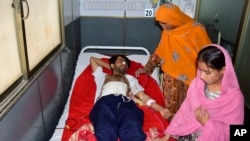Militant attacks have surged in Pakistan, killing more than 700 security forces and civilians in the first nine months of the year, according to a report released Saturday.
The Islamabad-based independent Center for Research and Security Studies, or CRSS, published the report a day after suicide bombings and insurgent raids in southwestern Baluchistan and northwestern Khyber Pakhtunkhwa provinces killed at least 69 people. No group has claimed responsibility for Friday's deadly violence.
The report noted that the number of fatalities from terrorist attacks this year has increased by 19 percent compared to 2022, with the two Pakistani provinces bordering Afghanistan suffering 92% of all fatalities.
"Pakistan's security forces lost at least 386 personnel, 36% of all fatalities — including 137 army and 208 police personnel — in the first nine months of 2023, marking an eight-year high," the CRSS said.
The report said 33 paramilitary forces, supervised by the army, also were among the fatalities.
The military, however, has confirmed the death of 214 of its soldiers and officers so far this year in counterterrorism operations and insurgent attacks, according to data compiled by VOA from official statements by the army's media wing, Inter-Services Public Relations.
Deadly day
Friday's attacks marked one of the deadliest days Pakistan has had in recent months. Most of the casualties occurred in Mastung, a volatile Baluchistan district, where a suicide bomber blew himself up in a crowd of devotees marking the birthday of the Prophet Muhammad.
The powerful blast killed 59 people and injured dozens more. The rest of the deadly violence took place in Khyber Pakhtunkhwa, targeting security forces.
The outlawed Tehrik-e-Taliban Pakistan, or TTP, the regional branch of the Islamic State terrorist group, known as the Islamic State-Khorasan, or IS-K, and separatist Baluch insurgents often claim or are blamed for the violence in Pakistan.
TTP claims many attacks
The TTP, a globally designated terrorist group, has primarily claimed recent attacks in Pakistan, targeting soldiers and police personnel. The group operates out of Afghanistan and has intensified attacks since the Taliban reclaimed control of the war-shattered neighboring country two years ago, according to Pakistani officials.
Commonly known as the Pakistani Taliban, the TTP is an offshoot and close ally of the Afghan Taliban. However, de facto Afghan rulers maintain they do not allow anyone to threaten Pakistan or other countries from their soil.
Islamabad has lately stepped-up diplomatic pressure on Kabul to prevent the TTP from staging cross-border terrorist attacks from Afghan sanctuaries.
Earlier this week, Foreign Minister Jalil Abbas Jilani confirmed that Taliban authorities had arrested 200 TTP militants in Afghanistan for launching attacks against Pakistan. The Afghan side has so far not challenged the claims.




